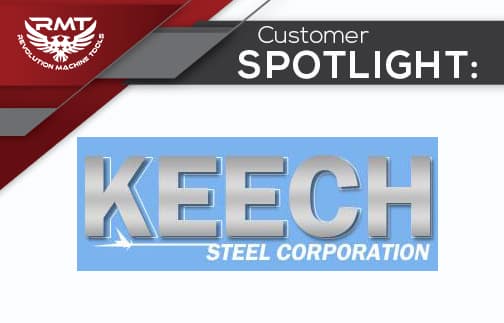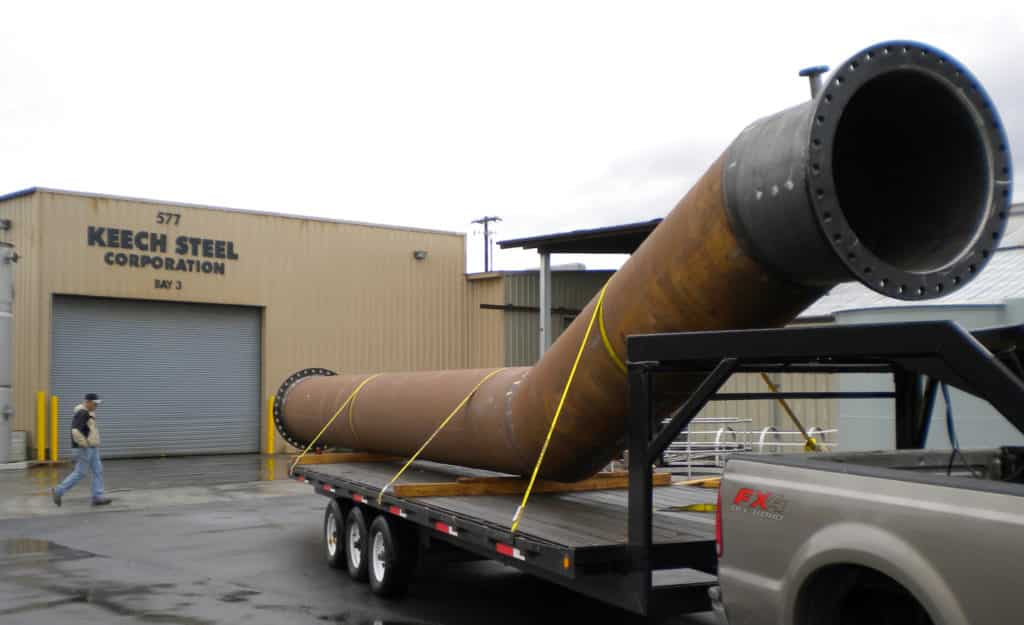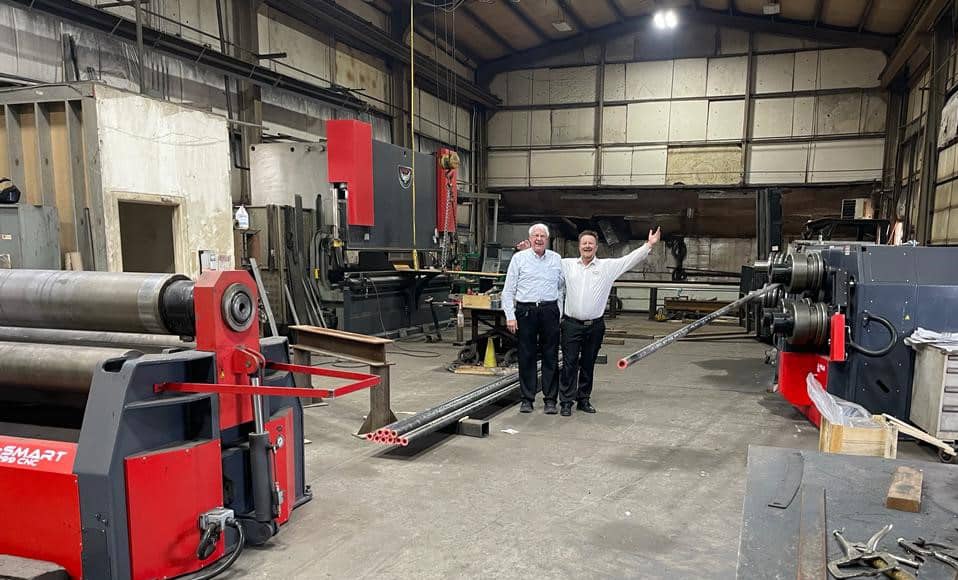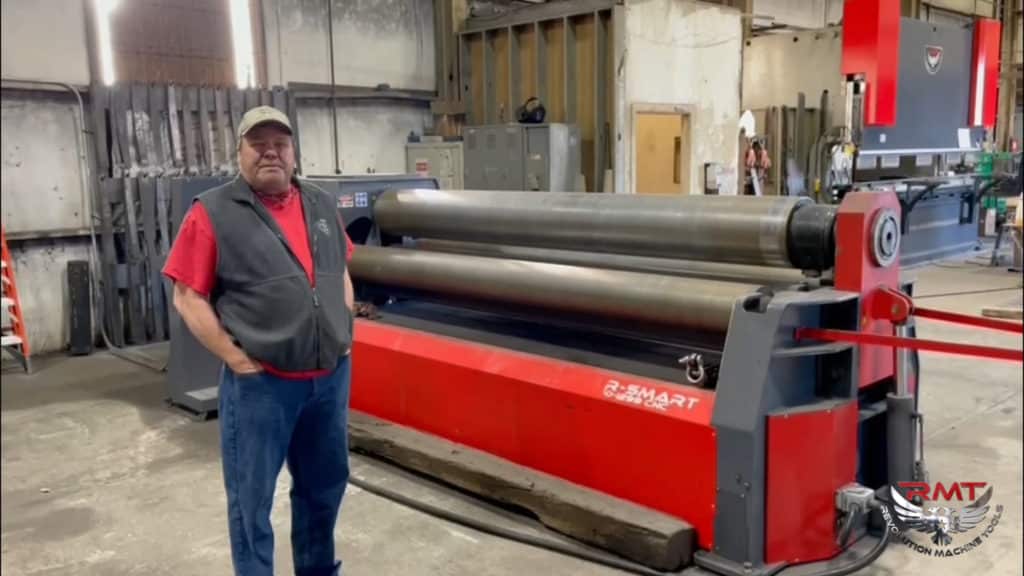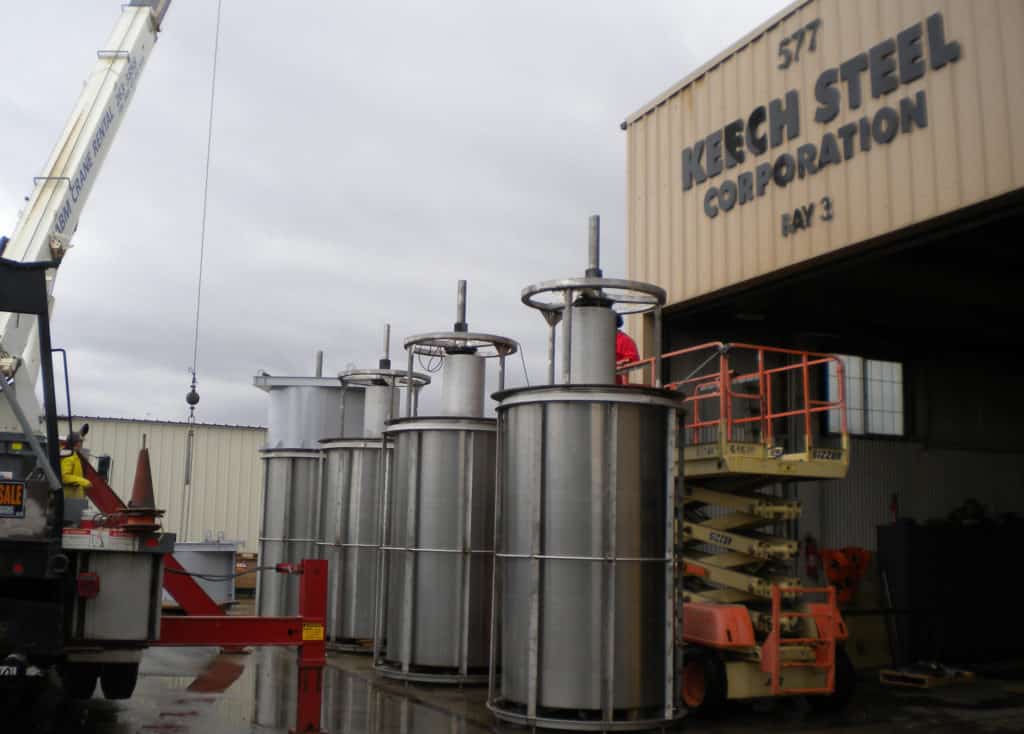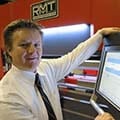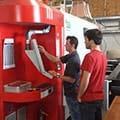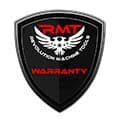A Legacy of Metalworking
Turning sideways in his office chair, Jim Keech gestured to a row of photos hanging behind his desk. That was his answer when asked about the types of metal fabrication projects he’d been involved with over the years. Each image portrayed a massive piece of equipment performing a behemoth task. It takes less than a minute in his presence to appreciate that Jim is a seasoned and experienced industry veteran.
“I’ve been in this business 57 years,” said the founder of Keech Steel Corporation. “I spent 23 years with Chicago Bridge and Iron here in Salt Lake. That’s where I started out, at the young, tender age of 18. I was a helper when I hired on, learned how to weld, progressed through the ranks—leadman, foreman.”
When the company’s Utah division shut down, Jim moved on to other firms in the area, as did his son Scott, who had joined him at Chicago Bridge seven years previously. “I didn’t want to transfer to Illinois,” Jim said, “so I went to work for other fabricators.”
Recognizing that he had generated a sizeable profit for these other companies, Jim decided it was time that he put his talents to work making money for himself. Together with sons Scott and Kevin, he started Keech Steel Corporation in 2005 in the same Salt Lake City location where the company still stands today. Working part time for themselves to build up clientele and earn enough money to purchase several pieces of metal fabrication equipment, the family business was soon running full-time. “It’s been quite a ride,” Jim reflected on their nearly two decades of business. “A fun one.”
A New Kind of Fabrication Company
Jim and Scott wanted to create a different style of fabrication business than the ones they were familiar with, a company where employees always felt valued. “You want to treat people how you want to be treated,” Jim observed. “That’s basically a Golden Rule.”
“That’s why we started the business,” Scott commented, “because we didn’t like the way we were being treated in the other places we worked. Plus, we’re heated and air conditioned—makes everybody happy.”
Jim added, “We’ve worked in shops that are hot in the summer and cold in the winter, and here we can have a warm shop in the winter and a cool shop in the summer. We don’t want to make it too cushy, but it’s very nice when it’s 100 degrees outside and it’s 80 degrees in the shop—that makes a lot of difference.”
Jim cited other benefits that come with working at Keech Steel Corporation: “We supply health insurance to our employees, and an IRA that we contribute to, kind of a profit-sharing program. We feed the employees lunch every Thursday and then we have a safety meeting. Safety is our number one goal.”
The employees at Keech are cross trained in other skills to help when things get busy. “There’s very few that are very specialized,” Jim stated. “They’re specialized in something, but they can do almost anything that’s needed. Scott has trained a number of them to drive the truck and run the plate rolls. We have one young man that Scott taught how to weld and he’s a machinist so he’s doing both. It’s just what you need to do to get the job done. Nobody is more important than anybody else.”
Keech Steel currently employs about 20 people, though they’ve had as many as 35 on staff at a single time. Jim speaks very highly of his team: “When we hire people, one thing I tell them is, ‘If I can’t trust you, I don’t want you here.’ So, I trust everybody that works here—that’s the easy part.”
“Everybody gets along,” Scott observed. “It’s great.”
Jim put it succinctly when he remarked, “The people you work with, you’re with them more than you are with your family. So basically, this is family—to me anyway. That’s how I feel about them.”
A Revolutionary Relationship
Revolution Machine Tools considers Keech Steel Corporation to be one of their key customers, though the seeds of that association were planted long before either company existed. It was when Jim was working at Chicago Bridge and Iron that he met Roger Jorgenson, father of RMT founder Kyle Jorgenson. “I knew Roger at Chicago Bridge and Iron,” Jim said. “I worked with him there. The company shut down here, so he started his own business.”
After Roger left Chicago Bridge, he became a salesman for a machine tool and metal fabrication equipment dealer in Salt Lake City. A few years later, he and his wife bought the company, eventually moving it to a location a mile and a half from where Keech Steel would soon be setting up shop. When Jim needed to buy a 10′ shear and an ironworker to start up, he thought of Roger, who was able to supply him with both. Roger’s son Kyle grew up working in his father’s business and kept the relationship with the Keech family going strong after Roger retired.
When the family business diversified out into other types of industrial projects, Kyle started Revolution Machine Tools to stay sharply focused on the priority that he and his father shared: being able to provide the finest in metalworking tools to fabricators in the local and national market. Keech Steel has continued to turn to the Jorgenson family first and foremost when shopping for fab machines. “Just about every piece of equipment we have in here is from them,” Jim said. Scott added that while some items in their machine shop were obtained elsewhere, “all the plate fabrication—plate rolls, benders, ironworkers—all of that came from Roger and Kyle.”
“Kyle has been very good to work with,” Jim said, noting that their friendship has been so strong that occasionally Kyle hasn’t asked him to put money down on a new machine, something virtually unheard of in the industry. “We’ve worked up a relationship with him. He’s been the number one supplier of equipment for our fabrication. He’s done a great job, a great job.”
Mastering Metalwork
From their humble beginnings with just the ironworker and shear, Keech Steel continued to acquire the tools necessary to tackle the jobs they were hired to perform. Scott Keech ticked off a list of additional pieces of fabrication equipment on the floor of their facility: “We have a 440-ton brake press with a 13′ bed on it, a 10′ by 5/8″ [plate] roll, an 8′ by 1/4″ roll, a 6′ by 1/4″ roll, two four-foot gauge rolls, a 96″ by 288″ burn table, and two [5″ x 5″ x ½” angle capacity] profile rolls.”
Along with requests to roll, bend, cut, and otherwise shape metal through fabrication techniques, Keech Steel gradually began to receive requests from customers for subtractive manufacturing processes as well. Being fabricators and not machinists, they originally jobbed out all work requiring milling, turning, boring, drilling, and other chip-making activities. Besides not making as much profit on such subcontracted jobs, they saw a significant loss of control on farmed-out projects, so they started to buy some machine tools so they could do everything in-house. “It fell into our pockets that way,” Scott said, “because if you send it out, you can’t guarantee when you’ll get it back.”
The more money they made, the more they were able to expand into other avenues of metalworking. As Jim recalled, “Yeah, we sent out a lot of work in the beginning until we got money to buy different equipment.” Now the only machining they farm out to others are jobs that are too big for their machine shop, which currently consists of a vertical boring mill, a horizontal boring mill, multiple smaller mills, a drill press, a band saw, a 20′ lathe, and two smaller lathes.
Projects to Be Proud of
The kinds of customers that seek out Keech Steel’s services are usually engineering firms and others that have sizeable projects in the offing, such as needing processing equipment for mining operations or wastewater treatment facilities.
The projects have been diverse. Jim remarked, “We built aluminum pontoons for some big houseboats down at Lake Powell, 60 something feet long. They liked it so much, their buddies wanted some, so we built some for their buddies.” Another was a project that they had to build onsite, a tower to train rescuers to climb and bring down injured workers from communication towers.
One of the biggest jobs Keech has ever done was a horizontal belt filter that they recently built for a project in the tar sands of northern Alberta. “It was 103 feet long, about 16 feet wide, ten and a half feet tall, 163,000 pounds,” Scott said. “On time, on schedule, it ran, and it left here on two trailers and one truck, all the way to northern Canada. That was a time crunch. That was amazing, everybody pitching in together.” He then commented, “We had to tear our fences down to get it out.”
“Yeah, we’ve had some fun, interesting projects,” Jim said. “That’s why being a job shop makes it interesting, because not everything is alike, something is different [with each job]. So, it keeps your interest up and your challenges up. It keeps the jobs interesting, all the way from estimating, to buying material for it, and figuring out how to sequence the assembly of it, and the welding sequences, and then handling.”
Jim added, “We just try to enjoy the jobs we have and have fun doing it.”
A Deserved Reputation
Jim credits his company’s excellent reputation in the industry to his team: “Everybody that does their job here—right from when it comes in the door till it leaves—everybody’s got a hand in it. It takes the whole crew to make it happen, by making a good quality product.” Speaking of Keech Steel’s customers, Jim said, “They’re happy to hear from us and we’re happy to hear from them, and we treat them like family. We’re gracious to them and we want to supply their needs for them, and when you treat them like that, yeah, they want to come back.”
In addition to having the machines in-house to handle the requests they receive, Keech Steel also stockpiles raw materials onsite, to have metal available at a moment’s notice. Scott said, “We stock everything from 1/8″ to 3″ in carbon, usually five to 10 sheets of each, and stainless from 10 gauge up to one inch, and aluminum too.”
They don’t just work in standard metals. “We’ve done a lot of exotic materials,” said Jim, rattling off a few. “AL-6XN, which is a duplex stainless, 904L stainless, which is a high nickel stainless, Inconel, Hastelloy.”
The reputation of a metal fabrication company is built two ways, through its people and its products. As Jim explained, “When you have good people in the company, then they treat people good. That’s what it boils down to—how well you treat people, customers, and each other. The proof of the pudding is in the tasting, and that’s about as good as it gets right there. If you’re pleased with the product you get, that’s what we want.”
Keech Steel Corporation has proven their reputation time and again over the years, being recognized today as a trusted name in steel manufacturing. Thanks to the continuing quality of their people and products, that recognition will last in the industry for many years to come.
